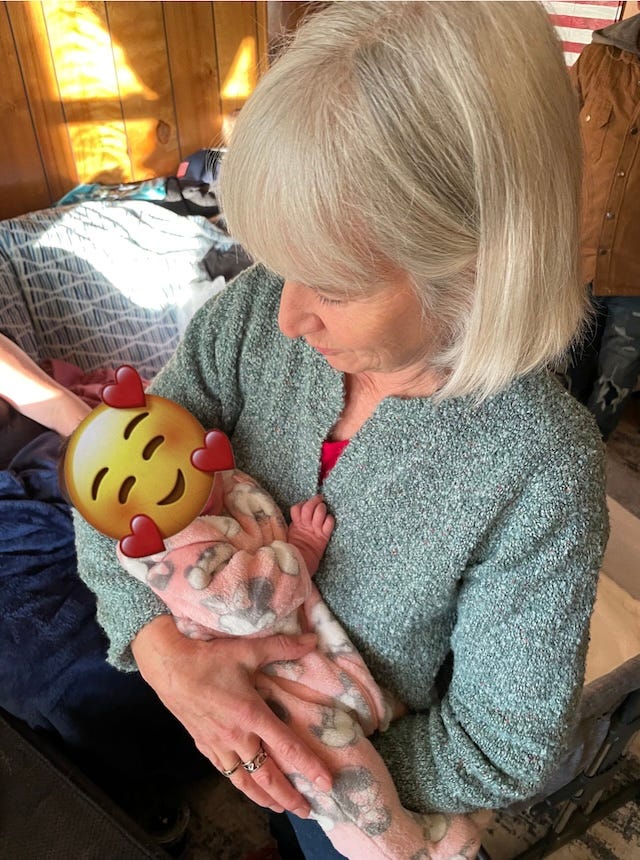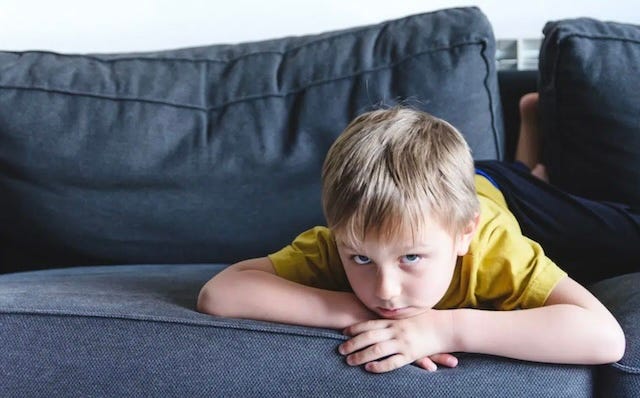Parenting Matters #96
By: Catherine Lynch and Glenn Collins
Dear Awesome Parent,
We hope the recent holidays were both enjoyable and meaningful for you.
But first, a personal note: Our 21st grandchild was born last week. She’s healthy and happy and so are her parents. We are, of course, overjoyed! Another grandchild to love, connect to, and bond with. We adore spending time with our grandkids - it’s tremendously meaningful to us. But as meaningful as a new grandchild is to us, it’s nowhere near as meaningful as it is to her parents. The birth (and raising) of a child is one of the most meaningful experiences a person can have in their life.
We’ve been thinking a lot about meaning lately.
In fact, it’s our word of the year. We’re making it a priority to add more meaning to our lives. That’s because we’re now firmly part of the sandwich generation. Our kids are grown and have kids of their own, but our parents are aging. We’re seeing first hand how a lack of meaning can cause people to lose interest in life. How easy it is for life to devolve into a repetition of days filled with TV, interrupted only for food and sleep. Not what we want for ourselves, our kids, or our grandkids!
You might be wondering why we're talking about meaning and old age in a parenting newsletter. Having meaning is our lives is one of the things that makes life worth living no matter what our age. It’s no secret that anxiety and depression are on the rise in kids today and there is a strong connection between lack of meaning and poor mental health. In a recent national survey, 36% of teens said they found little or no “purpose or meaning in life”. The number was even higher for young adults.
The fact is, our kids aren’t really that different than us. They want their lives to be meaningful too!
And they complain about lack of meaning all the time. They just don't use that word, so we don't usually notice. Instead, they say things like “Will you play with me?” Or “I'm bored!” Or “This is boring.”
Part of the trouble is that “meaningful” can change as they age. We all know play is critical for kids’ development, and it’s very meaningful to them. But as they become teens and young adults? Play is generally seen as less important - particularly by society.
There’s another problem too. Their brains’ reward circuitry can mislead them. Doing things they find meaningful activates the reward centers of their brains. It makes them feel good. The thing is, there are other activities that’ll trigger the reward circuitry too. Activities that are simply entertaining or pleasurable. It’s easy for them to gravitate to the purely pleasurable over the meaningful. This can be a problem even for adults but it’s especially true of kids with their less developed brains.
Aside: Don’t get us wrong! We’re not advocating for a life dedicated solely to meaningful activities. We believe in balance. Entertainment and pleasure for pleasure’s sake certainly have their place in our lives! But unless they’re balanced by meaningful activities, life feels hollow.
The link between meaning and a good life has been understood for at least as far back as there are records. Philosophers across the ages from Confucius to Epicurus in ancient times to Jean-Paul Sarte and Victor Frankl in the 20th century have all written about the importance of meaning in people’s lives.
So what makes for meaningful?
There’s debate about that, and many different answers, but here are some of the top ones:
Connection with other people
Pursuit of a passion or purpose
Creation and expression
Helping others
Contributing to a cause
Growth and personal development
Mastery of a skill or field of knowledge
Striving to overcome obstacles
In the end there’s no single right answer. Every person has to figure out what’s meaningful for themselves - our kids included.
So how can we help our kids find meaning when so often they seem drawn to the pleasurable? (TikTok, gaming, and Snapchat to name just a few)
We can’t force our kids (or anyone else) to find meaning in the things we think are meaningful. But we can use the tremendous power we have as parents to help steer them towards what we know has the potential to be meaningful in their lives. We can create a family culture that prioritizes meaningful activities over those that are purely pleasurable. That encourages them to participate in activities that can grow to give them meaning for the whole of their lives. That will set them on the path of choosing to seek meaning in their lives.
Want to point your kids in the direction of a more meaningful life? Here are some steps to consider:
Prioritize your relationship with them. The relationship you have with your child is one of the primary templates they use in forming and maintaining other relationships in their life. A strong healthy connection to you helps them form strong healthy relationships with others.
Encourage their friendships, with an emphasis on in-person activities.
Expose them arts, hobbies, or sports where there is opportunity for mastery of skills.
Encourage their curiosity and support their interests.
Limit their time spent on online pursuits.
Have ongoing conversations about what’s meaningful to you - and to them.
Help them try to find meaning in tasks that they don’t find inherently meaningful. For example: watching a younger sibling becomes working on their leadership skills. Or carrying in groceries becomes a mini workout.
And finally: You are your kids’ primary role model. They’re always watching you. So, how much of your time do you spend on meaningful activities?
Surprise Sunset
The sun had gone behind the clouds and the light was fading. I didn’t think there would be a sunset, but then the clouds lit up with this fiery glow.










Great post and an important focus for the year
Congratulations on your new grandchild. How meaningful :)